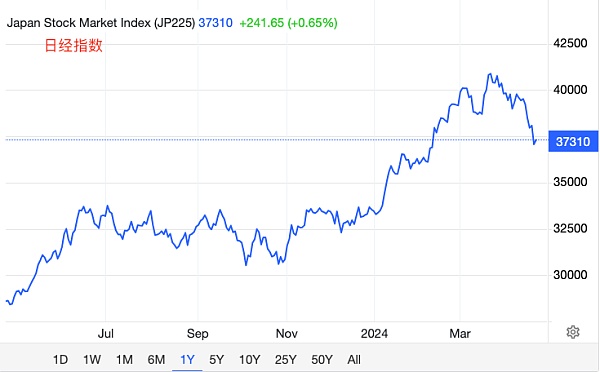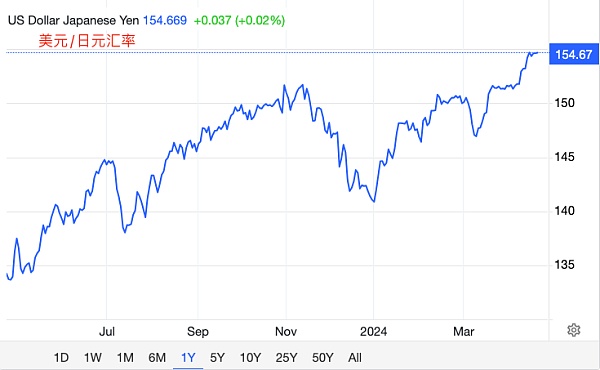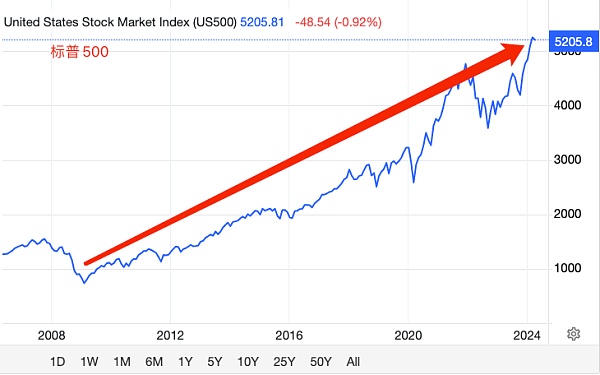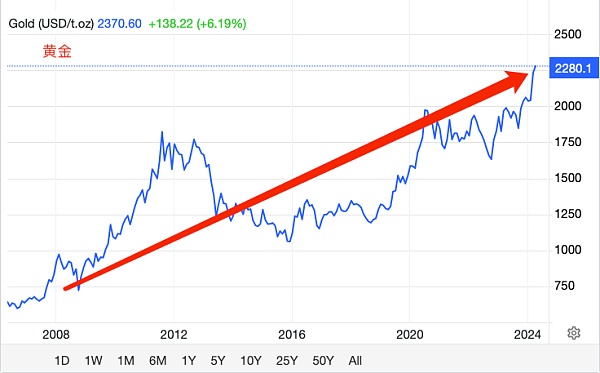Source: Liu Jiaolian
The Fed suddenly turned hawkish, striking back, and dealt a heavy blow to the market that had been looking forward to a rate cut. There were even rumors that the Fed might suddenly raise interest rates to 8%, hitting the world hard.
The Nikkei index, which had been touted by many financial KOL for its continuous rise not long ago, has also begun to turn downward.

But what is even more terrible is that the exchange rate of the Japanese yen against the US dollar began to fall rapidly.

Perhaps what many people are wondering is that the Bank of Japan has rarely raised interest rates. Why has the yen weakened? Perhaps the logic should be reversed: It is precisely because the Bank of Japan could not withstand the pressure of currency depreciation that it was forced to break the convention and rarely raise interest rates.
In fact, despite the sharp rise in the Nikkei index, the exchange rate depreciation has not increased much. From 28,500 points to 37,300 points, the exchange rate fell from 1:133 to 1:155, and the annual increase was only 12%.
If you protect assets but not exchange rates, both assets and exchange rates will be lost in the end. If you protect exchange rates but not assets, both assets and exchange rates will be preserved in the end. Ignoring the criticism from the public, allowing leverage to explode, and scraping the bone to cure the poison, this requires great courage - I'm talking about Bitcoin.
In an attempt to save the market and protect asset prices, leveraged speculative capital pushed up shipments, and capital flight caused pressure on the exchange rate to depreciate, forcing the central bank to raise interest rates to stabilize the exchange rate depreciation. The interest rate hike led to a collapse in asset prices, and in the end, neither assets nor exchange rates could be saved. The Bank of Japan seems to be facing this unsolvable dead end.
When we talk about this impasse of the Bank of Japan, the default frame of reference is the US dollar.
Now let us replace the Japanese stock market with the US stock market, the Bank of Japan with the Federal Reserve, the Japanese yen with the US dollar, and the US dollar with gold, and then deduce this situation.
If something happens to the U.S. stock market, the Federal Reserve will definitely step in to rescue the market and protect asset prices. This has been verified in the 2008 financial crisis and the 2020 epidemic circuit breaker.
If the Federal Reserve intervenes to rescue the market and protect asset prices, capital can take the opportunity to increase shipments.
Here comes the key point: to promote capital flight after shipment, and put pressure on the dollar to depreciate. What does that mean? In other words, the price of gold keeps rising. This is exactly what is happening now.
This will force the Fed to raise interest rates, or at least maintain high interest rates, to mitigate the pressure of the dollar's rapid depreciation. The Fed is talking about inflation on the surface, but the real pressure comes from the depreciation of the dollar.
Continuing to raise interest rates (crazy) or maintaining high interest rates for a long time will inevitably lead to a banking system crisis (the collapse of Silicon Valley Bank in 2023 has already served as a reminder) and the collapse of assets such as U.S. stocks.
Once the asset shows signs of collapse, the Federal Reserve will immediately rescue the market and maintain asset prices, thus returning to the beginning of the game and starting an endless cycle. This endless cycle has become a "perpetual motion machine" that drives the dollar down and gold up - until the Federal Reserve pushes the entire United States into an irreversible situation and finally collapses completely, and the "perpetual motion machine" completely shuts down.
The above is easy to verify. Just pull out the trend chart of US stocks and gold since the financial crisis in 2008 and you can see it clearly.

The above picture shows the "15-year bull run" of the S&P 500. The Fed, as amazing as it is, has really achieved the "ironing cycle" that economists dream of. The rescue operation is so smooth that the US stock market has not had a clear bull-bear cycle for 15 years. Has the Fed really defeated the economic law?

At the same time, gold also began to "break the seal" and re-emerge.
The real American elite class knows clearly that to maintain the status of the dollar, they must never relax their suppression of gold. From Roosevelt's Decree No. 6102 in 1933 to the Dodd-Frank Act in 2011, the United States has never relaxed its suppression of gold. As the country with the largest gold reserves, the United States has the largest chips to short gold and suppress the gold market.
Some people have figured out this weakness of the United States. The financial war against the United States is to seize the "important key" above, continue to buy gold, increase the gold exchange rate, promote capital flight, and push the dollar to depreciate.
This is exactly the strategy of "shooting the bull from behind the mountain".
In 2008, a man also understood this "shooting the bull from behind the mountain" situation. At the same time, he felt that gold was too easily controlled by the United States, so he wanted to make a better kind of gold, distribute the chips from scratch, and eliminate the ability of the United States to control the chips and short. So this person invented something similar to electronic gold, which he called "Bitcoin". This person gave himself a pseudonym, called "Satoshi Nakamoto".
One big difference between Bitcoin and gold is that its control does not rely on violence (armed force) but only on mathematics (cryptography). Violence can easily be monopolized by the state, and in fact it is monopolized. Mathematics cannot be monopolized by the state. In this way, gold can easily be centrally controlled by the state, because individuals cannot have enough weapons to compete with state power, and thus cannot fundamentally ensure their ownership of gold. Bitcoin is different. Personal power is equal to state power, and your private key cannot be forcibly taken away even by a powerful country like the United States.
In this way, the decentralization of Bitcoin ownership will deconstruct the monopoly of the state. It makes sense to talk about the United States as a whole controlling a large amount of gold, but it makes no sense to talk about the United States as a whole controlling a large amount of Bitcoin, because Bitcoin deconstructs the concept of the United States as a whole. An American investor who holds gold is first an American, and then a gold holder. Michael Saylor, the boss of MicroStrategy who holds Bitcoin, is first a Bitcoin holder, and then an American.
Bitcoin is internationalist. Bitcoin private key holders are true internationalists.
It may take another 50 or even 100 years for everyone in the world to fully and thoroughly understand this.
Sun Tzu's Art of War says: "When I want to fight, even if the enemy has high ramparts and deep trenches, they will be forced to fight me. I should attack what they must defend."
Pushing up the prices of gold and Bitcoin is like launching a hypersonic precision-guided missile, directly hitting the vital point of U.S. finance - the U.S. dollar.
However, the current size of Bitcoin (1.3 trillion US dollars) is too small compared to gold (16 trillion US dollars), only about one-tenth of the latter, and can only serve as a flanking assist.
Every 1% increase in gold is equivalent to a 10% increase in Bitcoin. A 10% increase in gold is equivalent to a 100% increase in Bitcoin.
From October last year to now (April 2024), gold has risen from $1820 to $2370, a 30% increase. During the same period, Bitcoin has risen from about 25k to 65k today, a 160% increase.
Ten times 30% is 300%. 160% is only half of 300%, and the other half, about 150%, is still owed and has not increased. If 65k increases by 150%, it will be 90,000-100,000 dollars.
If gold stops at $2,400 and Bitcoin continues to rise to $100,000, then the results of wing assists will be no less than those of frontal attacks.
If gold attacks the dollar head-on and Bitcoin assists from the flank with the same effect as the main attack, then the damage to the dollar will be doubled.
As a result, the Federal Reserve was caught in a dilemma: it was forced to continue to maintain high interest rates or even raise interest rates in order to reverse the decline of the US dollar.
Unfortunately, this time, as soon as the Federal Reserve sounded hawkish, the U.S. stock market collapsed, but gold and Bitcoin did not follow the U.S. stock market at all. Instead, one was around $2,400 and the other was around 65k. They sat on the Diaoyutai, crossed their legs, ate peanuts, drank beer, and waited to see the Fed's good show.








